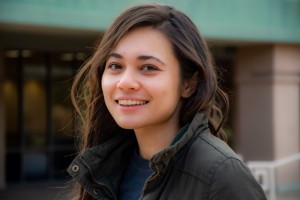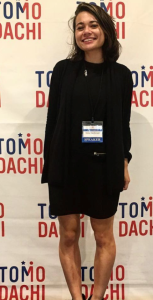Q&A with TOMODACHI Program Participants and TOMODACHI Alumni: Mikka Kei Macdonald

Mikka Kei Macdonald is an alumna of the TOMODACHI Daiwa House Student Leadership Conference IV in 2017.
She is the Creative Director at Community Change, a non-profit organization based in Washington, D.C. working to build the power and capacity of low-income people, especially people of color, to change the policies and institutions that impact their lives. She is a progressive campaign specialist, writer, designer, illustrator, and an avid ultramarathon runner. Her work has appeared in several publications such as The Washington Post, Vox, Variety, and TIME Magazine. She has also been quoted in outlets including POLITICO and The Wall Street Journal. Her personal writing has appeared in The Daily Beast, ChangeWire, DCist, WAMU, Amy Poehler’s Smart Girls, and the Aspen Institute.
This interview was part of the U.S.-Japan Council’s initiative to highlight strong leaders in the community who are actively creating positive change for people of color in the United States and beyond during Asian Pacific Heritage Month. Her related posts are found in many social media outlets.
This interview was conducted virtually on May 9th, 2021 by Maho Suzuki, TOMODACHI Alumni Intern (2021) based out of Tokyo, Japan.
Q1: What was your motivation for joining the TOMODACHI Daiwa House Student Leadership Conference?
I participated in the program because I wanted to be more academic and professional. I had recently published a paper in the Princeton Journal for Asian American Studies about the Japanese American internment and their personal experiences during World War II. As a result, I was trying to determine how to effectively translate my interest in U.S.-Japan relations, history, and Japanese American history into my career and my professional life.
TOMODACHI seemed like a great opportunity to learn more about how to integrate those interests into my everyday life. I wanted to learn more about how to better understand U.S.-Japan relations.
Q2: Did the experience in the TOMODACHI program impact your interests or career?
Absolutely. The program was outside of college and one of the few chances that I had to explore what it means to be Japanese American and the way my identity impacted my personal relationship with the country of Japan. It made me aware of the many ways that I could contribute to U.S.-Japan relations even if I am not in the foreign service or working overseas. It just provided me with more knowledge about how to further improve the relationship between the U.S. and Japan.
Q3: One of your passion projects explores the Japanese American internment camps and the intersection of policy and their personal experiences during World War II. Could you tell me more about that?
I work in U.S. politics. I work in policy and I help argue for policies that I believe help Asian Americans and people of color in the United States. I think there’s a lot to be learned from the past. For me, this means understanding Japanese American history and the experiences of my parents and grandparents even if I don’t like hearing about their difficult experiences. It is crucial to find the time and space to recognize the reality and validity of past events in order to ensure that similar events do not occur in the future. Once is more than enough.
In my day-to-day life, I try to do my part to ensure that history doesn’t repeat itself. Working on this particular project allowed me to do that. Moreover, I was able to integrate what I have learned from this project into my current career. I have been able to successfully translate what I learned from school, my academic projects, and TOMODACHI into my career and put that knowledge into practice as I work to improve modern U.S. policies.
Q4: Discrimination against Asians due to the spread of COVID-19 is now a problem. How do you think this kind of discrimination can be eliminated?
I think it is important to continue to build relationships with different people because it is difficult to understand the complexity of others or broaden your horizons without finding common ground with others who may have different beliefs and values. I think it is important to be authentic and share your background with others. It is important to be honest about who you are and where you come from because I think people who discriminate are cruel and don’t see how much they have in common with others. I am not just a Japanese American, I am an irreplaceable person: a daughter, a sister, a friend, and a partner. This is why it is important to continue to exercise self-compassion. I am currently exploring different means of self-care.
Q5: How would you like to be involved in the U.S.-Japan relationship in the future?
I would love to be invited into settings like this one and I would love to build relationships with more people who are either Japanese or Japanese American who are also involved in politics. I think I’d like to better understand my own cultural history and continue to draw attention to the Japanese American internment camps and their relevance today.

Mikka attended the TOMODACHI Generation Summit 2018 as an alumni speaker
Q6: What does TOMODACHI mean to you?
To me, TOMODACHI means a willingness to learn about a relationship that you thought you already understood. As a Japanese American, I thought I knew what Japanese and American relations looked like. TOMODACHI means understanding the full breadth of the relationship. U.S. – Japan relations is more than sending students to Japan or the United States for an exchange program. It is not just economic relations. It is not just tourism and it’s not just cultural or artistic exchange either. In reality, U.S.-Japan relations is a well-rounded relationship with so many different parts that I can only begin to understand. The TOMODACHI program also enabled me to deepen my connection to my Japanese heritage. I live in the United States, and since my grandparents tried to assimilate to the U.S. after being in the internment camps, I didn’t have as much of a connection to Japan. The community was very inviting and it was wonderful to be seen as a member of that community.
Q7: What are your ambitions for the future?
I would love to be able to keep writing, learning, and figuring out new ways that I can better impact and understand Japanese American identity. Following the pandemic, I would love to be able to gather in person with other members of the Japanese American community in the United States and talk about what that identity means. I would love to get to a point where I can travel more freely overseas. I work in U.S. politics a lot, especially domestic politics. I think there’s a lot of overlap between how we govern domestically and how we deal with foreign relations. I would love to help bring national and domestic politics closer together.
Q8: Any advice for the next generation?
I think a lot of my work is about remembering the past and trying to better understand the facts that impacted me personally such as World War II in the United States and the Japanese internment camps. My advice for the next generation would be to continue to remember the past, nurture new opinions, and be as empathetic and compassionate as possible. Sometimes, especially when we are from different cultures, it can feel like we don’t have much in common. The reality is that we have more similarities than differences. Building relationships in a compassionate manner can broaden your horizons and have an incredibly positive impact on your worldview.


